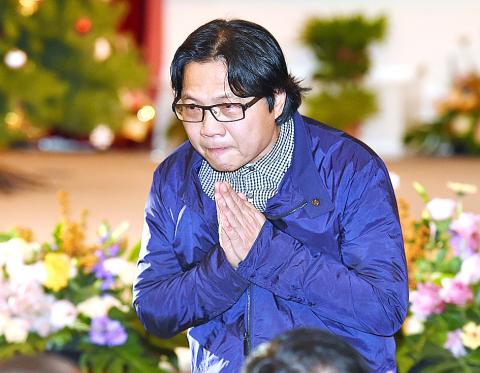A group of academics yesterday launched a petition to request that the Ministry of Education revoke its decision to appoint National Taiwan University (NTU) professor Kuan Chung-ming (管中閔) as the university’s president.
Among the academics were Academia Sinica academicians Chen Lan-bo (陳良博) and Chou Chang-hung (周昌弘), NTU professor Jang Show-ling (鄭秀玲), NTU professor emeritus Ho De-fen (賀德芬), NTU adjunct professor Chang Ching-hsi (張清溪) and Taiwan Association of University Professors president Lin Hsiu-hsin (林秀幸).
Although the Executive Yuan said that it cannot revoke the ministry’s decision to appoint Kuan, there are “valid legal means” to do so, they said in a joint statement.

Photo: Liao Chen-huei, Taipei Times
Kuan was elected NTU president on Jan. 5 last year and was originally scheduled to take office the next month, but the ministry in May demanded a re-election on the grounds that Kuan failed to disclose a possible conflict of interest in the election, as he served as an independent director at Taiwan Mobile Co and company vice president Richard Tsai (蔡明興) sat on the election committee.
Former minister of education Yeh Jiunn-rong (葉俊榮), who took office in July, initially instructed the university to redo parts of the election without Tsai to correct what he called a “procedural flaw” in the process.
However, after the university repeatedly refused, citing a lack of legal basis, Yeh on Monday last week announced that he would “reluctantly agree” to Kuan’s appointment and ordered the university to submit a report reviewing the controversies that arose during the presidential election.
He tendered his resignation the following day after the decision drew a backlash.
Yeh’s announcement came just two days before the Executive Yuan rejected three administrative appeals filed by the university, Kuan and a group of NTU students requesting that Kuan be appointed based on their interpretation of the law.
Yeh must have known that the Executive Yuan would reject the appeals and decided to appoint Kuan in advance without the approval of Premier William Lai (賴清德), the academics said yesterday.
While Yeh’s behavior was “extremely ridiculous,” what they found “most regrettable” was the Executive Yuan’s claim that Kuan’s appointment cannot be revoked, they said.
Article 117 of the Administrative Procedure Act (行政程序法) stipulates that government agencies and their superior authorities can revoke a previously issued administrative injunction that is found to be illegal and falls within their jurisdiction, they added.
As an NTU presidential candidate has filed an administrative appeal against the Executive Yuan over Kuan’s appointment, the ministry should review whether its decision to appoint him is legal, as stipulated in Paragraph 2, Article 58 of the Administrative Appeal Act (訴願法), and revoke the decision, the academics said, referring to an administrative appeal filed by NTU professor Wu Ruey-beei (吳瑞北) on Friday last week.
Meanwhile, Yeh has contravened the Public Functionary Service Act (公務員服務法), which bans civil servants from contradicting a superior’s instructions that fall within their jurisdiction and promoting the personal interests of themselves or others by abusing their position, they said.
By “debunking the government’s lies” about the appointment being irreversible, the academics said that they hope more people would join their call to revoke Kuan’s appointment before he takes office on Tuesday next week.

Alain Robert, known as the "French Spider-Man," praised Alex Honnold as exceptionally well-prepared after the US climber completed a free solo ascent of Taipei 101 yesterday. Robert said Honnold's ascent of the 508m-tall skyscraper in just more than one-and-a-half hours without using safety ropes or equipment was a remarkable achievement. "This is my life," he said in an interview conducted in French, adding that he liked the feeling of being "on the edge of danger." The 63-year-old Frenchman climbed Taipei 101 using ropes in December 2004, taking about four hours to reach the top. On a one-to-10 scale of difficulty, Robert said Taipei 101

Nipah virus infection is to be officially listed as a category 5 notifiable infectious disease in Taiwan in March, while clinical treatment guidelines are being formulated, the Centers for Disease Control (CDC) said yesterday. With Nipah infections being reported in other countries and considering its relatively high fatality rate, the centers on Jan. 16 announced that it would be listed as a notifiable infectious disease to bolster the nation’s systematic early warning system and increase public awareness, the CDC said. Bangladesh reported four fatal cases last year in separate districts, with three linked to raw date palm sap consumption, CDC Epidemic Intelligence

Taiwanese and US defense groups are collaborating to introduce deployable, semi-autonomous manufacturing systems for drones and components in a boost to the nation’s supply chain resilience. Taiwan’s G-Tech Optroelectronics Corp subsidiary GTOC and the US’ Aerkomm Inc on Friday announced an agreement with fellow US-based Firestorm Lab to adopt the latter’s xCell, a technology featuring 3D printers fitted in 6.1m container units. The systems enable aerial platforms and parts to be produced in high volumes from dispersed nodes capable of rapid redeployment, to minimize the risk of enemy strikes and to meet field requirements, they said. Firestorm chief technology officer Ian Muceus said

MORE FALL: An investigation into one of Xi’s key cronies, part of a broader ‘anti-corruption’ drive, indicates that he might have a deep distrust in the military, an expert said China’s latest military purge underscores systemic risks in its shift from collective leadership to sole rule under Chinese President Xi Jinping (習近平), and could disrupt its chain of command and military capabilities, a national security official said yesterday. If decisionmaking within the Chinese Communist Party has become “irrational” under one-man rule, the Taiwan Strait and the regional situation must be approached with extreme caution, given unforeseen risks, they added. The anonymous official made the remarks as China’s Central Military Commission Vice Chairman Zhang Youxia (張又俠) and Joint Staff Department Chief of Staff Liu Zhenli (劉振立) were reportedly being investigated for suspected “serious